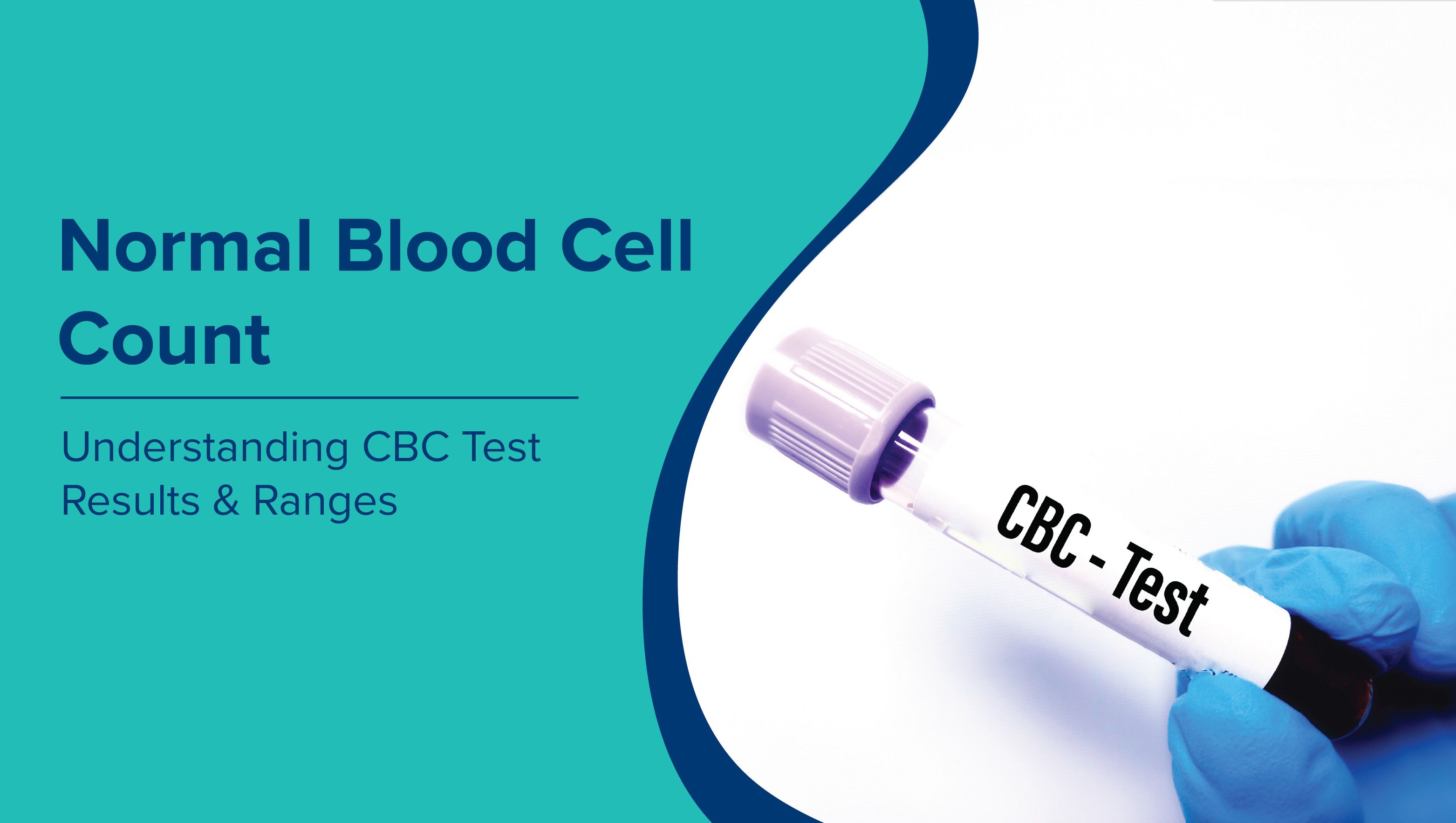The Complete Blood Count (CBC) test is a routine yet vital diagnostic tool used to evaluate overall health and detect a wide range of medical conditions. By measuring the levels of red blood cells, white blood cells, and platelets, the test provides important insights into how well the body is functioning. That said, interpreting CBC results requires an understanding of normal blood cell count ranges and what any deviations may indicate. To help, in this article, we’ll explore the components of a CBC test, outline standard reference values, and highlight what these results can reveal about underlying health status. Let’s start by understanding the basics.
What is a CBC Test and What Does it Measure?
A Complete Blood Count (CBC) is a routine blood test that evaluates the overall health of the blood by measuring different components in a blood sample, including red blood cells (RBCs), white blood cells (WBCs), platelets, haemoglobin, and haematocrit. It helps detect conditions such as anaemia, infections, clotting disorders, and immune system abnormalities.
Each component of the CBC serves a different function in the body, such as:
- RBCs carry oxygen from the lungs to the body’s tissues.
- WBCs are part of the immune system and help fight infection.
- Platelets support blood clotting and wound healing.
- Haemoglobin is the protein in red blood cells that carries oxygen.
- Haematocrit reflects the proportion of blood volume made up of red cells.
Normal Blood Cell Count: Key CBC Values Explained
Understanding what counts as a normal CBC result is essential for identifying potential health issues early. Although reference ranges may differ slightly between laboratories, certain baseline values are generally accepted for healthy individuals across age groups.
Here are the commonly accepted normal ranges:
- Red Blood Cells (RBC):
- Males: 4.7 to 6.1 million cells/µL
- Females: 4.2 to 5.4 million cells/µL
- Children: 4.1 to 5.5 million cells/µL
- White Blood Cells (WBC): 4,500 to 11,000 cells/µL
- Haemoglobin (Hb):
- Males: 13.8 to 17.2 g/dL
- Females: 12.1 to 15.1 g/dL
- Haematocrit (Hct):
- Males: 40.7% to 50.3%
- Females: 36.1% to 44.3%
- Platelet Count: 150,000 to 450,000 platelets/µL
These values may vary based on age, sex, altitude, hydration, and pregnancy. For example, normal blood count for females may shift slightly during different stages of life, and children have their own reference range that changes with growth. Any deviation from these values should be assessed by a healthcare provider in the context of symptoms and other test results.
How to Read a CBC Report and Understand the Results
A CBC test report provides a detailed breakdown of various blood components, each listed with a measured value, unit, and reference range. Understanding how to read the report helps identify whether a result is within normal limits or requires further medical evaluation.
Key terms commonly seen in a CBC report include:
- RBC (Red Blood Cell Count): Indicates oxygen-carrying capacity.
- WBC (White Blood Cell Count): Reflects immune system activity.
- Hb (Haemoglobin): Measures the oxygen-carrying protein in red blood cells.
- Hct (Haematocrit): Proportion of blood made up of red cells.
- Platelets: Important for blood clotting and wound healing.
- MCV, MCH, MCHC: These values describe red blood cell size and haemoglobin content.
A normal CBC report will show all values within the reference range. Abnormal findings, such as elevated WBC or low haemoglobin, may indicate conditions like infection, inflammation, or anaemia.
CBC Interpretation: What High or Low Values May Indicate
A Complete Blood Count (CBC) not only reveals current health status but also provides early clues about underlying conditions. Deviations from the cbc normal range, whether high or low, can help doctors narrow down the cause of symptoms and decide the next steps in diagnosis or treatment.
Common CBC Findings and What They May Suggest:
-
Low Red Blood Cell Count (Low RBC / Low CBC Count): May indicate anaemia, blood loss, nutritional deficiencies (such as iron, B12, or folate), or chronic kidney disease.
-
Elevated Red Blood Cell Count: May result from dehydration, lung disease, heart conditions, or a rare bone marrow disorder known as polycythaemia vera.
-
Low White Blood Cell Count: Could be due to viral infections, autoimmune disorders, or the effect of medications such as chemotherapy.
-
High White Blood Cell Count: Often associated with infections, inflammation, leukaemia, or physical stress.
-
Low Platelet Count: Can be linked to viral infections, bone marrow disorders, or autoimmune conditions such as ITP (immune thrombocytopenic purpura).
-
High Platelet Count: May occur due to infections, inflammatory diseases, or bone marrow issues.
Abnormal CBC test results should always be interpreted alongside symptoms and other investigations. A single reading is rarely diagnostic on its own.
When Do You Need a CBC Blood Test?
A CBC blood test is often one of the first investigations recommended when a person shows signs of general illness, fatigue, or unexplained symptoms. It is also commonly included in routine health check-ups and pre-surgical evaluations.
Situations where a CBC test may be recommended include:
- Persistent fatigue or weakness
- Fever, chills, or signs of infection
- Unexplained bruising or bleeding
- Rapid heart rate or shortness of breath
- Monitoring chronic conditions such as anaemia, kidney disease, or cancer
- Before starting or during treatment (e.g., chemotherapy, surgery)
It is also used to evaluate the effectiveness of medications that may affect blood cell production.
CBC Test in Pregnancy: What to Expect
A CBC test in pregnancy is a standard part of prenatal care. It helps monitor the mother’s blood health and detect conditions that could affect both maternal and foetal wellbeing.
During pregnancy, blood volume increases, and certain changes in blood cell counts are expected. A CBC can help identify:
- Anaemia, commonly caused by iron deficiency
- Infections, indicated by abnormal white blood cell counts
- Clotting issues, through platelet count monitoring
The test is typically done in the first trimester and repeated later if needed. Abnormal findings may prompt dietary recommendations, iron supplements, or further tests.
CBC Test Uses: Beyond Basic Diagnosis
Beyond identifying illnesses, the CBC test is a valuable tool for tracking recovery and monitoring long-term health. It offers important insights that support medical decisions throughout a treatment journey.
Other important uses of the CBC test include:
- Monitoring ongoing conditions such as chronic anaemia, blood disorders, or immune system diseases
- Assessing response to treatments, including chemotherapy or certain medications
- Pre-operative evaluation, to ensure blood levels are within safe limits before surgery
- Routine health checks, especially in older adults or those with lifestyle-related risks
Regular CBC testing is often part of a larger care plan, especially in people managing chronic illness.
CBC Test Procedure: Step-by-Step
The CBC test procedure is quick and simple, usually completed within a few minutes. It involves drawing a small blood sample, which is then analysed in a laboratory for various components.
Steps involved in the CBC test:
- A healthcare professional cleans the area (usually the inside of the elbow or back of the hand).
- A sterile needle is inserted into a vein to collect a blood sample.
- The sample is stored in a tube and sent to a lab for analysis.
- The needle is removed, and a bandage is applied.
- The entire process typically takes less than 10 minutes.
The procedure causes minimal discomfort and does not require any downtime.
How Do I Prepare for a CBC Test?
Preparing for a CBC blood test is usually simple and does not require major changes to routine activities. In most cases, fasting is not required, unless the CBC is part of a broader test panel that includes blood sugar or cholesterol checks.
Preparation tips for a CBC test:
- Inform the healthcare provider about any medications being taken.
- Wear clothing that allows easy access to the arm for sample collection.
- Stay hydrated, as it can make vein access easier.
- No need to fast unless instructed otherwise.
This test is safe for all age groups and is often performed as part of regular health check-ups.
CBC Test Cost and Report Timing
The cost of a CBC test in India is generally affordable and may vary slightly depending on the location and whether it is done individually or as part of a larger test package. When booked through MaxAtHome, the pricing remains transparent, with no hidden charges.
CBC reports are usually available within 24 hours of sample collection. The test results are delivered digitally, making it easy to access, share with doctors, or maintain personal health records.
For the most accurate pricing, patients can contact MaxAtHome or explore available test packages on the platform.
Why Choose MaxAtHome for CBC Test?
MaxAtHome brings diagnostic services to the doorstep, making it easier for individuals to monitor their health without visiting a clinic or hospital. A CBC test at home offers both convenience and accuracy, especially for those with mobility issues, chronic conditions, or busy schedules.
Benefits of choosing MaxAtHome for a CBC test include:
- Home sample collection by trained phlebotomists
- NABL-accredited lab processing for reliable results
- Expert-verified reports, ensuring clinical accuracy
- Digital report delivery, easily accessible via phone or email
- Safe and hygienic procedures, especially suitable for elderly or high-risk individuals
To book a CBC test at home, call 9240299624 or schedule the test online through our easy-to-use booking platform.
Frequently Asked Questions
What is a CBC test and why is it done?
A CBC test or Complete Blood Count is a diagnostic blood test used to measure red blood cells, white blood cells, haemoglobin, haematocrit, and platelets. It helps detect conditions like anaemia, infections, and clotting disorders. Doctors often recommend it for general health checks or when symptoms like fatigue or fever are present.
What is the CBC blood test normal range for adults?
The CBC blood test normal range varies slightly, but in general:
- RBC: 4.2–6.1 million cells/µL
- WBC: 4,500–11,000 cells/µL
- Platelets: 150,000–450,000 platelets/µL
Always consult a healthcare provider for age- and gender-specific interpretation.
What does a low red cell blood count indicate?
A low red cell blood count may suggest anaemia, blood loss, nutritional deficiencies, or chronic illnesses such as kidney disease. It is often followed up with iron studies or additional tests to determine the cause.
What is the CBC test cost and how soon are results available?
The CBC test cost at MaxAtHome is affordable and includes home sample collection. Results are typically available within 24 hours and can be accessed digitally.
Is CBC test done on an empty stomach?
Usually, CBC test fasting is not required. However, if it’s part of a broader health panel, the doctor may recommend fasting. Always confirm with the healthcare provider before the test.
How is the CBC procedure done at home?
The CBC procedure involves drawing a small blood sample from a vein, usually in the arm. With Nursing Procedure support from MaxAtHome, a trained nurse or phlebotomist performs the test safely and hygienically at home.
What is the importance of CBC test during pregnancy?
The CBC test in pregnancy helps detect anaemia, monitor white blood cell counts, and assess platelet levels to ensure the health of both mother and baby. MaxAtHome offers the convenience of female nurses for 12/24 hour homecare during pregnancy.
How is CBC report analysis linked to cardiac health?
An abnormal CBC report, especially if combined with symptoms like fatigue or shortness of breath, may prompt further testing such as Holter Monitoring or ECG to rule out cardiac issues.
Can CBC help monitor ongoing conditions?
Yes. A CBC is useful in tracking ongoing health conditions such as infections, recovery after chemotherapy, or blood disorders. It is often used alongside services like Ambulatory BP Monitoring for complete health evaluation.
When should someone schedule a CBC test at home?
A CBC test at home is ideal when symptoms like unexplained weakness, fever, or bleeding occur. It is also suitable for routine monitoring. With Doctor Visit at Home services, follow-up care is easily accessible after receiving results.















